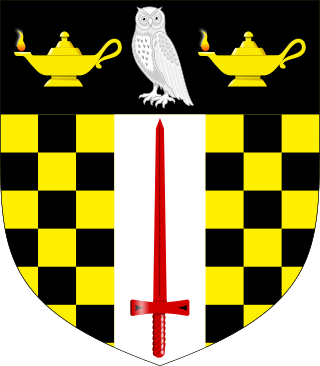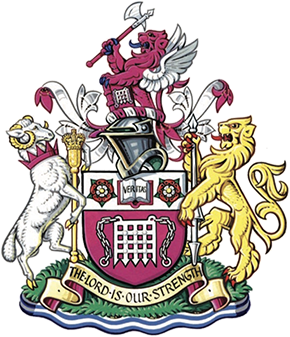The Guildhall School of Music and Drama is a music and drama school located in the City of London, England. Established in 1880, the school offers undergraduate and postgraduate training in all aspects of classical music and jazz along with drama and production arts. The school has students from over seventy countries. It was ranked first in both the Guardian’s 2022 League Table for Music and the Complete University Guide's 2023 Arts, Drama and Music league table. It is also ranked the sixth university in the world for performing arts in the 2022 QS World University Rankings.

London Metropolitan University, commonly known as London Met, is a public research university in London, England. The University of North London and London Guildhall University merged in 2002 to create the university. The University's roots go back to 1848.

The University of North London (UNL) was a university in London, England, formed from the Polytechnic of North London (PNL) in 1992 when that institution was granted university status. PNL, in turn, had been formed by the amalgamation of the Northern Polytechnic and North-Western Polytechnic in 1971. In 1996, the university celebrated its centenary, dating from the year of the Northern Polytechnic's founding. UNL existed until 2002, when it merged with London Guildhall University to form London Metropolitan University. Its former premises now form the university's north campus, on Holloway Road and Highbury Grove, Islington.
In the UK, a post-1992 university, synonymous with new university or modern university, is a former polytechnic or central institution that was given university status through the Further and Higher Education Act 1992, or an institution that has been granted university status since 1992 without receiving a royal charter. This is used in contrast to "pre-1992" universities.

The Worshipful Company of Haberdashers, one of the Great Twelve City Livery Companies, is an ancient merchant guild of London, England associated with the silk and velvet trades.

The Worshipful Company of Curriers is one of the ancient livery companies of London, associated with the leather trade.

Birmingham City University is a university in Birmingham, England. Initially established as the Birmingham College of Art with roots dating back to 1843, it was designated as a polytechnic in 1971 and gained university status in 1992.

London South Bank University (LSBU) is a public university in Elephant and Castle, London. It is based in the London Borough of Southwark, near the South Bank of the River Thames, from which it takes its name. Founded in 1892 as the Borough Polytechnic Institute, it achieved university status in 1992 under the Further and Higher Education Act 1992.

The UCL Institute of Education (IOE) is the faculty of education and society of University College London (UCL). It specialises in postgraduate study and research in the field of education and is one of UCL's 11 constituent faculties. Prior to merging with UCL in 2014, it was a constituent college of the University of London. The IOE is ranked first in the world for education in the QS World University Rankings, and has been so every year since 2014.

City, University of London, is a public research university in London, United Kingdom, and a member institution of the federal University of London. It was founded in 1894 as the Northampton Institute, and became a university when The City University was created by royal charter in 1966. The Inns of Court School of Law, which merged with City in 2001, was established in 1852, making it the university's oldest constituent part. City joined the federal University of London on 1 September 2016, becoming part of the eighteen colleges and ten research institutes that then made up that university.

Birkbeck, University of London, is a research university, in Bloomsbury London, England, and a member institution of the University of London. Established in 1823 as the London Mechanics' Institute by its founder, Sir George Birkbeck, and its supporters, Jeremy Bentham, J. C. Hobhouse and Henry Brougham, Birkbeck is one of the few universities to specialise in evening higher education in the United Kingdom.

The University of Westminster is a public university based in London, United Kingdom. Founded in 1838 as the Royal Polytechnic Institution, it was the first polytechnic to open in London. The Polytechnic formally received a Royal charter in August 1839, and became the University of Westminster in 1992.

The College of Haringey, Enfield and North East London (CONEL) is a college of further and higher education in North London, England. The current college was founded in 2009 as a result of a merger between Enfield College and The College of North East London (Conel). The college has centres in Tottenham and Enfield and draws its students mainly from the boroughs of Haringey, Enfield, and Hackney, Since 2017 the college is a part of Capital City College Group (CCCG) alongside City and Islington College and Westminster Kingsway College.

Sir Roderick Castle Floud FBA is a British economic historian and a leader in the field of anthropometric history. He has been provost of the London Guildhall University, vice-chancellor and president of the London Metropolitan University, acting dean of the School of Advanced Study at the University of London, and provost of Gresham College (2008–2014). He is the son of Bernard Floud MP.
A polytechnic was a tertiary education teaching institution in England, Wales and Northern Ireland offering higher diplomas, undergraduate degree and post graduate education that was governed and administered at the national level by the Council for National Academic Awards. At the outset, the focus of polytechnics was on STEM subjects with a special emphasis on engineering. After the passage of the Further and Higher Education Act 1992 they became independent universities which meant they could award their own degrees. The comparable institutions in Scotland were collectively referred to as Central Institutions.

Sir John Cass was an English merchant, Tory Member of Parliament and philanthropist. He was also a key figure in the Royal African Company, which was involved in the Atlantic slave trade.

University of the Arts London is a collegiate university in London, England, specialising in arts, design, fashion and the performing arts. It is a federation of six arts colleges: Camberwell College of Arts, Central Saint Martins, Chelsea College of Arts, the London College of Communication, the London College of Fashion, and the Wimbledon College of Arts. It was established as The London Institute in 1986, became a university in 2003, and took its present name in 2004. The university hosts one of the largest international student bodies out of all universities in the United Kingdom.

Sir David Hugh Wootton is an English lawyer and politician. He was the 684th Lord Mayor of London, from 2011 to 2012, and is the Alderman of the Ward of Langbourn.

The statue of John Cass is a lead figure by Louis-François Roubiliac of John Cass (1661–1718), the English merchant and Member of Parliament. The original statue of 1751 now stands in the Guildhall in London. There is also a fibreglass replica at the School of Art, Architecture and Design at London Metropolitan University in Jewry Street, installed in 1998.

















